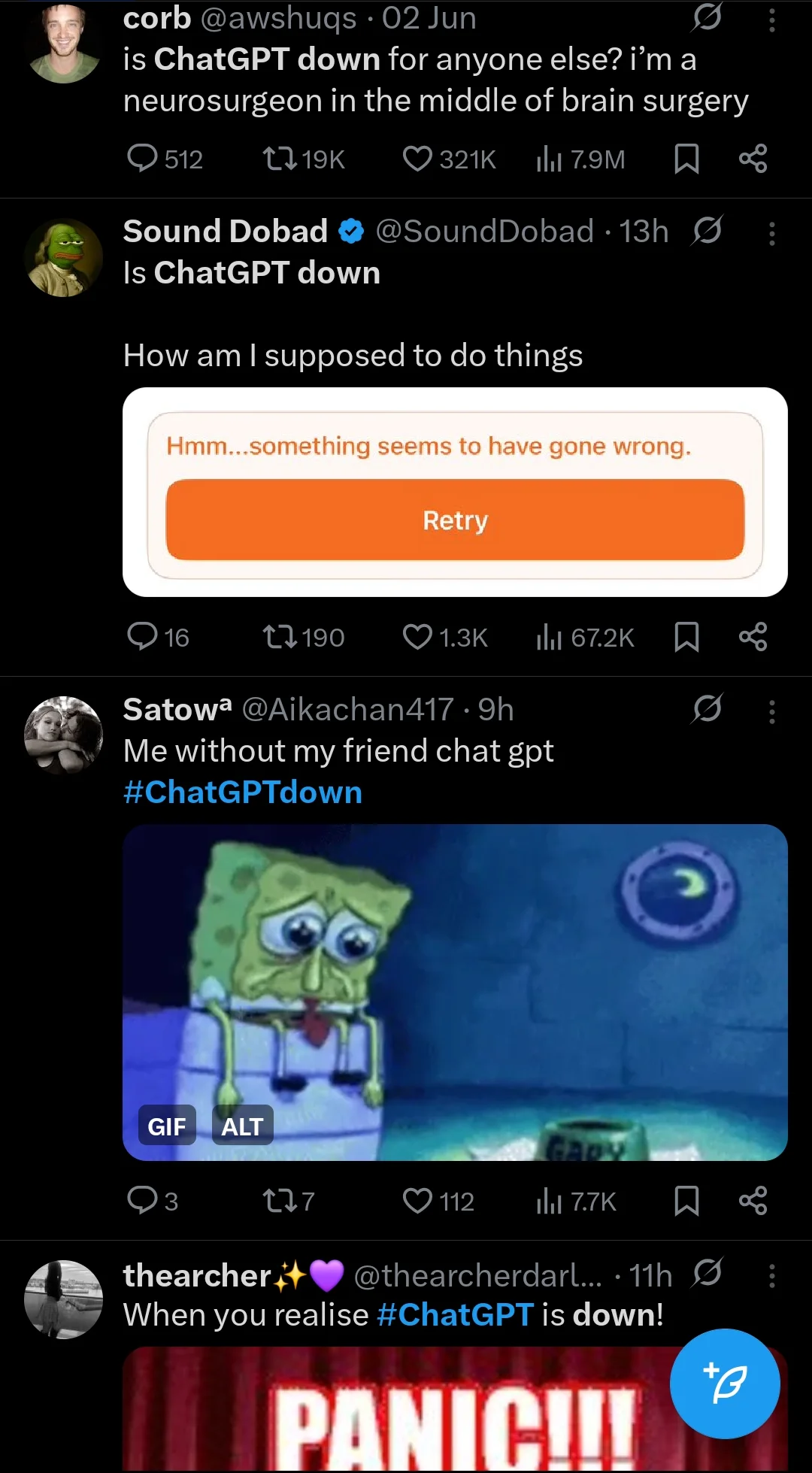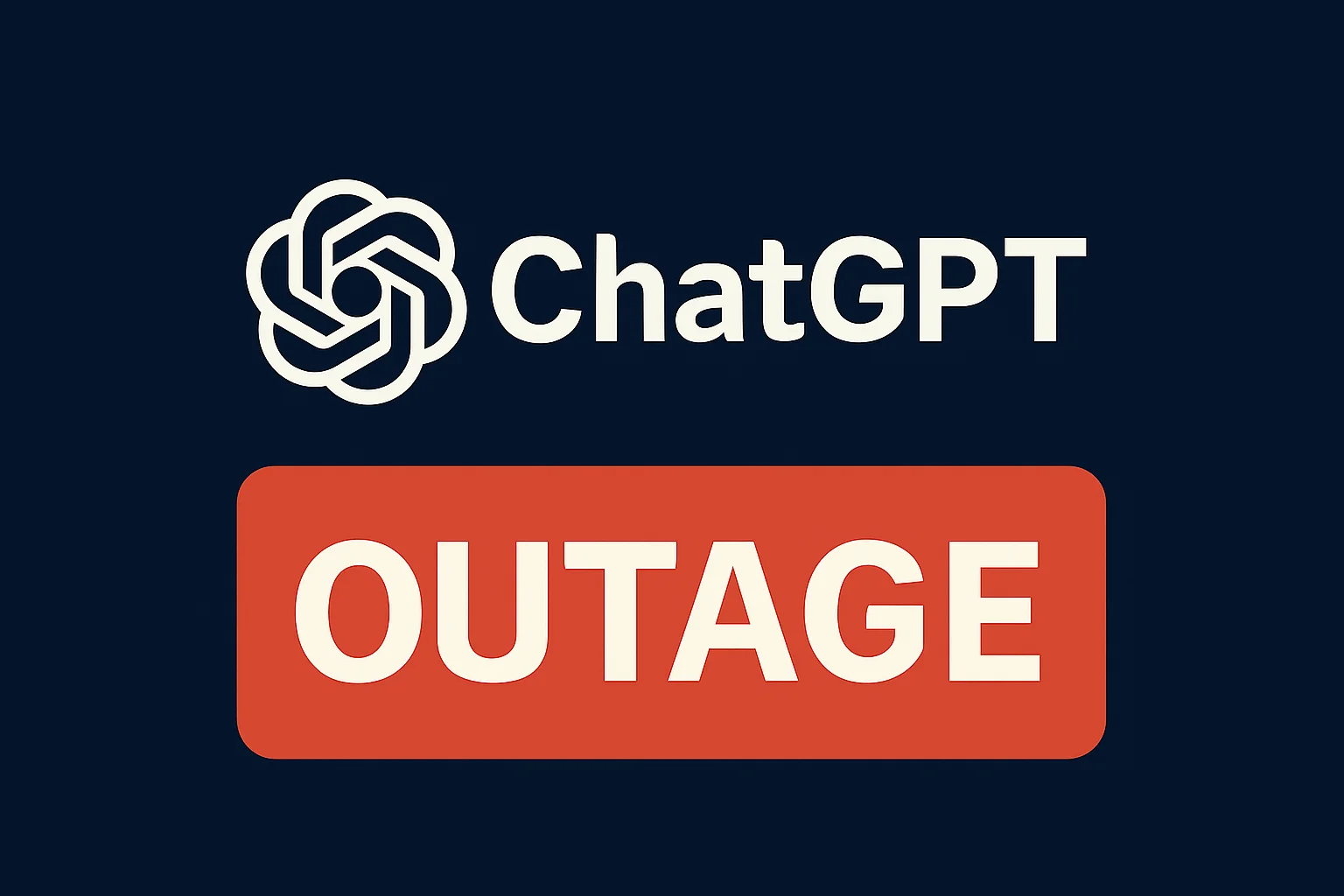On June 10, 2025, millions of users worldwide experienced a jarring reminder of AI dependency when ChatGPT suffered a major global outage. Students panicked mid-assignment, developers watched API calls fail, and productivity workflows ground to a halt. The disruption lasted several hours, affecting everything from GPT-4 to the OpenAI Playground, revealing just how deeply AI has integrated into our daily routines.
June 10, 2025, OpenAI’s flagship tool ChatGPT went offline.
Users experienced a massive outage, disrupting work, school, and everything in between.
Whether you were writing code, finishing an assignment, or looking for emotional support from your favorite AI, it felt like a blackout.
Services including GPT-4, GPT-3.5, API, and Playground were impacted.
OpenAI cited elevated error rates and began restoring access within a few hours.
Students, developers, marketers, and meme creators were all caught off guard.
The World’s Favorite Chatbot Went Silent
Nowadays, using ChatGPT is second nature.
You type a prompt, get a response, and move on with your day. But on the morning of June 10, something felt off.
No responses. No helpful suggestions. Just loading screens, vague errors, and a whole lot of waiting.
At first, people thought it was their Wi-Fi. Then their browser. But pretty quickly, it became clear—ChatGPT was down.
For casual users, it was a small annoyance. But for students in the middle of writing papers, developers mid-debug, or marketers finalizing a launch… it was a full stop.
AI had quietly become part of the daily workflow—and now it was suddenly missing.
Social media didn’t take long to catch on. Hashtags like #ChatGPTDown and #AIpocalypse trended within minutes.
The reactions were funny, sure. But behind the jokes was a quiet reality: when one tool disappears, we really notice how much we depended on it.
Unofficial reports say productivity dropped 100% — citation: everyone on Twitter.

What Caused the Outage?
OpenAI confirmed that the disruption stemmed from a backend infrastructure issue that led to elevated error rates across multiple services.
The outage hit GPT-4, GPT-3.5, the API, Playground, and even ChatGPT Plus users.
As of 2:00 PM ET, services had begun to stabilize, but lingering issues remained into the afternoon.
Sora, OpenAI’s video tool, recovered earlier. Meanwhile, developers using the Playground reported continued downtime while OpenAI engineers worked to mitigate the issue.
Who Was Hit the Hardest?
Let’s be real: everyone felt it. But some groups were hit harder than others.
Some Chinese AI platforms like ByteDance’s Doubao and DeepSeek had even shut down intentionally due to national exams. But with OpenAI, it was entirely unplanned — and deeply felt.

How Long Did the Outage Last?
The outage began during the late morning ET and lasted several hours.
By 12:30 PM ET, the OpenAI status had shifted from red (major outage) to yellow (“elevated error rates”), and tools like Sora were functioning again.
By mid-afternoon, ChatGPT usage began returning to normal — though many users still reported slow performance or incomplete responses well into the evening.
How to Check If ChatGPT is Down
If you ever suspect another outage, here are the official tools to check first:
Is ChatGPT Still a Reliable Option?
Despite this outage, ChatGPT remains one of the most stable AI platforms on the web.
That said, as demand surges and AI becomes more deeply integrated into our lives, occasional service hiccups may happen.
It’s a good reminder to diversify your digital toolbox — and maybe, just maybe, remember how to write a sentence solo.
Frequently Asked Questions
ChatGPT Went Down, and So Did Productivity
For a few hours, people got a reminder of what it’s like to work without instant AI support.
No quick drafts, no code fixes, no fast explanations.
Just open tabs, forums, and good old-fashioned trial and error.
It wasn’t catastrophic—but it was revealing. Tools like ChatGPT have become part of how we think, plan, and get things done. When that tool suddenly disappears, even briefly, it throws off more than just convenience—it pauses entire workflows.
Outages like this aren’t new, and they’re not going away.
As AI becomes more baked into everyday work and learning, moments like this are a good nudge to stay flexible. Have alternatives. Keep perspective. And don’t build everything around a single platform—no matter how good it is when it’s working.
Similar widespread disruptions have affected other major tech platforms, reminding us that even the most reliable services can experience unexpected downtime. For more insights on managing technology outages, check out our coverage of major tech outages affecting multiple platforms.

Thanks for reading!
If you found this helpful, like it, share it, and check out more of our content.
About The Author
Nikolas V.
Deviate Solutions LLC
I’ve spent years navigating computer science, digital marketing, business development, and day trading; chasing entrepreneurship and independence. Now I help businesses grow and expand through the latest technology and industry strategies. With all I learn and experience, I use my platform to break down complex insights so you can think differently about technology, your business, and your finances. Everything I share comes from real experience and plenty of trying and failing. Failure is part of the game. Always take the shot, Let’s learn to win together.
Get In Touch






